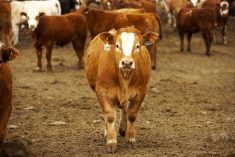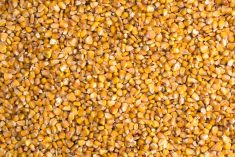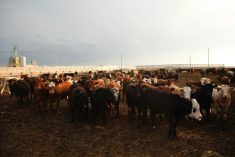Manitoba cattle producers whose usual markets for finished cattle were temporarily out of reach this spring and summer may now be able to offset some of the resulting extra feed bills.
Federal Agriculture Minister Marie-Claude Bibeau and her Manitoba counterpart, Blaine Pedersen, on Thursday announced the 2020 Canada-Manitoba Finished Cattle Feed Assistance Program, an AgriRecovery plan budgeted for up to $2.5 million in federal funds.
Applications are now being accepted for the program, with a deadline of Dec. 1.
Read Also

Alberta crop conditions improve: report
Varied precipitation and warm temperatures were generally beneficial for crop development across Alberta during the week ended July 8, according to the latest provincial crop report released July 11.
The program is expected to provide owners of finished cattle $1.20 per day per animal, up to a maximum 63 days — that is, $75.60 per head — toward their costs to feed animals “beyond their expected marketing dates.”
The costs must have been incurred during a period when cattle were ready for market and slaughter, but major Alberta beef packers had either closed or cut operating hours due to COVID-19 outbreaks.
For this program, the “extraordinary feed period” — which includes the “time needed to address the cattle supply backlog in Western Canada” — is defined as April 15 to Aug. 31, 2020.
Put another way, the “extraordinary feed period” began either April 15 or when the cattle in question reached the minimum eligible weight (for steers, 1,400 lbs.; for heifers, 1,300 lbs.), whichever date came later. That feed period must have run for at least 14 days and ended either by Aug. 31 or on the actual slaughter date of the cattle, whichever date came first.
Applicants must also have owned the cattle for at least 60 days before slaughter and must have missed intended marketing dates due to “COVID-19-related slaughter interruptions.”
Payments won’t be issued on fewer than five eligible animals, nor for amounts that work out to less than $200.
The AgriRecovery funds are federal, as Ottawa has said it would put up its share of funds for such programs for the 2020-21 year without requiring provincial contributions — but the Manitoba government will take applications and handle payments.
The program follows COVID-19 outbreaks this spring at major beef plants in Alberta which infected hundreds of workers and killed two, plus the father of a third, and had a ripple effect across Canadian cattle markets.
Against rising case numbers, Cargill shut its High River, Alta. plant for two weeks in April and the JBS plant at Brooks temporarily slowed from two shifts to one, leading to backlogs at feedlots that were estimated to have peaked at around 130,000 animals in May. — Glacier FarmMedia Network














